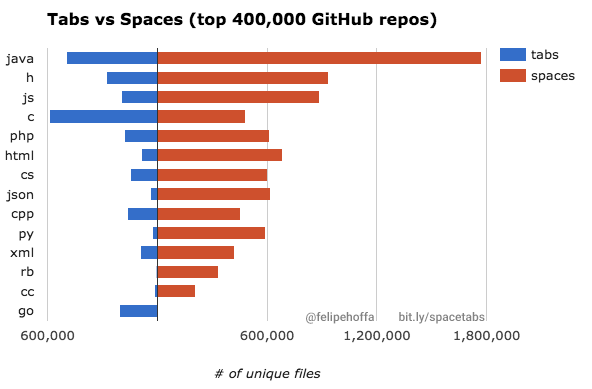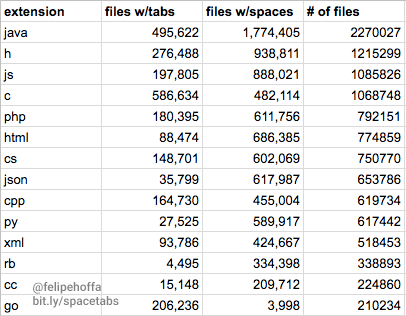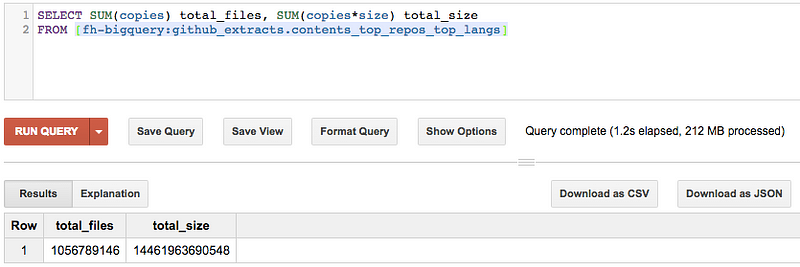Using tabs or spaces when writing a new line of code has been one of the fiercest battles ever fought among coders. Because we don’t live in a perfect world where everybody indents and aligns according to the same standards, the debate is ultimately reduced to how source-code is displayed in editing software. Conflict arises because code doesn’t display nicely if there is no consistency throughout the file, which can get especially tricky when several coders are involved in the same project.
The debate has been around for so long that it has become polarizing enough, so that coders now proudly self-classify to as “tab people or “space people.”
Tabs or spaces – A battle in BigQuery
Our long-time collaborator and Google developer advocate Felipe Hoffa set out to find an answer. Felipe’s data came from GitHub files stored in BigQuery. He considered the top 400,000 repositories, sorted by number of starts received on Github between January and May, 2016. He only considered files with more than 10 lines of code, and excluded duplicates. In cases where files used both tabs and spaces, he gave the vote to whichever method was used more frequently.
Below is his original post on Medium, where he parses a billion files among 14 programming languages to decide which one is on top – tabs, or spaces.

The rules:
- Data source: GitHub files stored in BigQuery.
- Stars matter: We’ll only consider the top 400,000 repositories — by number of stars they got on GitHub during the period Jan-May 2016.
- No small files: Files need to have at least 10 lines that start with a space or a tab.
- No duplicates: Duplicate files only have one vote, regardless of how many repos they live in.
- One vote per file: Some files use a mix of spaces or tabs. We’ll count on which side depending on which method they use more.
- Top languages: We’ll look into files with the extensions (.java, .h, .js, .c, .php, .html, .cs, .json, .py, .cpp, .xml, .rb, .cc, .go).
Numbers

How-to
I used the already existing [bigquery-public-data:github_repos.sample_files] table, that lists the files of the top 400,000 repositories. From there I extracted all the contents for the files with the top languages extensions:
SELECT a.id id, size, content, binary, copies, sample_repo_name , sample_path
FROM (
SELECT id, FIRST(path) sample_path, FIRST(repo_name) sample_repo_name
FROM [bigquery-public-data:github_repos.sample_files]
WHERE REGEXP_EXTRACT(path, r'\.([^\.]*)$') IN ('java','h','js','c','php','html','cs','json','py','cpp','xml','rb','cc','go')
GROUP BY id
) a
JOIN [bigquery-public-data:github_repos.contents] b
ON a.id=b.id
864.6s elapsed, 1.60 TB processed
That query took a relative long time since it involved joining a 190 million rows table with a 70 million rows one, and over 1.6 terabytes of contents. But don’t worry about having to run it, since I left the result publicly available at [fh-bigquery:github_extracts.contents_top_repos_top_langs].
In the [contents] table we have each unique file represented only once. To see the total number of files and size represented:
SELECT SUM(copies) total_files, SUM(copies*size) total_size FROM [fh-bigquery:github_extracts.contents_top_repos_top_langs]

Then it was time to run the ranking according to the previously established rules:
SELECT ext, tabs, spaces, countext, LOG((spaces+1)/(tabs+1)) lratio
FROM (
SELECT REGEXP_EXTRACT(sample_path, r'\.([^\.]*)$') ext,
SUM(best='tab') tabs, SUM(best='space') spaces,
COUNT(*) countext
FROM (
SELECT sample_path, sample_repo_name, IF(SUM(line=' ')>SUM(line='\t'), 'space', 'tab') WITHIN RECORD best,
COUNT(line) WITHIN RECORD c
FROM (
SELECT LEFT(SPLIT(content, '\n'), 1) line, sample_path, sample_repo_name
FROM [fh-bigquery:github_extracts.contents_top_repos_top_langs]
HAVING REGEXP_MATCH(line, r'[ \t]')
)
HAVING c>10 # at least 10 lines that start with space or tab
)
GROUP BY ext
)
ORDER BY countext DESC
LIMIT 100
16.0s elapsed, 133 GB processed
Analyzing each line of 133 GBs of code in 16 seconds? That’s why I love BigQuery.
Space people, rejoice
According to the data, the winner here is spaces. C is the only major language where spaces were not used in the most popular files on GitHub. This might just be as close as we will ever get in discovering whether tabs or spaces are more popular.
The reason for the popularity of spaces might be that they display consistently across all hardware and text viewing software. However, it is still unclear whether spaces are objectively, qualitatively better than tabs.
Like this article? Subscribe to our weekly newsletter to never miss out!







Great post on code repository analysis , I have written a blog on bigquery http://sajeetharan.blogspot.com/2016/09/digging-into-bigdata-with-googles.html?m=1